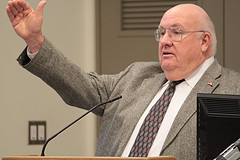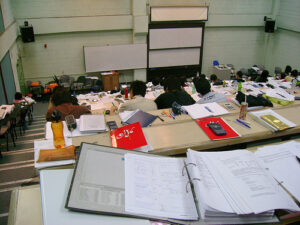TIME LOSS, PART 4:
 “Housekeeping” kills time and fosters false expectations.
“Housekeeping” kills time and fosters false expectations.
This is the fourth in a 7-part series on how false time expectations cause us stress, frustration and a loss of time and money. Here’s a list and links to the first three of the posts in this series.
How we fool ourselves by believing false time “estimates.”
The evil ETA system costs us time and money!
8 ways Colleges lie about instructional time.
Housekeeping duties in classrooms take away valuable time from the learning process, yet, some of the time it’s useful!
If you are keeping track, (!) I’ve already listed 8 ways colleges lie about instructional time (see Part 3 in this series) as an example of how businesses, companies, and ordinary people, mislead us with false time estimates. This is number 9.
Nobody knows (or will tell us) how long it takes to do anything! They always guess and hope you’ll believe them!
THE HOUSEKEEPING CONUNDRUM
Of the 45 minute classroom “hour,” in a college, at a bare minimum, 5-15 minutes will be devoted to housekeeping: returning or accepting assignments, Q and A, etc. 
You could argue that a lot of this material is necessary for the proper running of a classroom and I would agree but let’s look at how this actually works.
First, many professors in college still do a roll call.
There are many reasons for this, not least of which is to determine how much classroom time each student has actually completed.
This is done to in order to asses why students might be falling behind or to be able to check a student’s overly high expectations (or manufactured entitlements) when you could prove they rarely came to class. And so on.
Now, many colleges say to hell with this because the students are considered adults and the college is not responsible for the nonattendance of students.
Fair enough, except that so many students are so weak these days that attendance is mandatory for them to get even the basics of the course material.
Moreover, some Profs actually care that their students do well.
Besides, many Profs consider classroom participation essential to the work.
If you’re not there, you can’t participate. There are other reasons for monitoring attendance too but that’s not my point here.
There are ways to check the attendance other than the 3-5 minute exercise of calling out names (electronic devices, for example).
Second, there are legitimate questions students want to ask about the course material.
Some of this can be handled by email or class intra-communication systems.
Third, there may be special arrangements to make in certain courses.
Bear with me, for a moment while I torture you with the details of this example. It’ll give you an idea of a fairly legitimate ways in which time can be used and yet considered lost.
For years I offered a theater course for which we went to at least two plays during the semester.
I managed to get students reduced prices for the plays but only if I personally bought the tickets in bulk in advance so I had to organize it, have the students come in prepared to select the dates and the number of tickets and then bring me the money (usually in a subsequent class because students are usually broke!). More time taken up!

There was a lot of time used up in this necessary activity. I hated it, because it took time form the real work of studying the plays but otherwise the students would have to have bought tickets at higher prices.
Then we arranged transportation pools and the students wanted to meet for a pizza before the theater.
Then came the inevitable changes.
People having ordered three tickets, now wanted only two. People who failed to order in time now wanted tickets. (They did not get them!)
Some people wanted to add extra tickets. Etc etc.
Now, you might rightly ask, are these students babies?
(I’m afraid to answer that question!)
Many students had never been to the theater before.
Some had never been to the big city before (my college campus was an hour north of Toronto) and some students from other cities in Ontario had no cause to drive a hour to Toronto, a big place they were somewhat anxious about.
In any case, many students in residence had no access to a car.
I had mixed feelings about it.
Fourth, Profs often have to hand out material in class.
Yes, some of it can be put on the electronic college blackboard for downloading by individual students. Sometimes, in order to ensure the students actually have the material in front of them (they are not all expert in bring requisite materials to class–to put it mildly), the Prof lugs the stuff to the classroom.
Yes, you could say, again, to hell with the students if they have no sense of responsibility and Profs often do say that. But not always.

Fifth, Profs have to take in essays, reports etc. (Yes, you could say the students could send them electronically but do I have to remind you how dicey that can be?
With different computer programs and spam and etc.?)
Both of these can frequently be replaced by electronic means but that process can’t cover every eventuality.
Sixth, after class meetings with students are often arranged in this time.
Yes, you can also do it on-line or on the telephone but those do not cover all situations.
So, there you have it.
Housekeeping can be scheduled for 5 minutes a class but it always takes longer. The time estimate is always elastic in this case. That’s life.
But it still takes up a lot of time!
NEXT:
Work kills time and encourages phony time estimates.
If this article was of interest, please click here to join the free registration for Self-Knowledge College. I’ll be sending you a lot of free solid information about YOU!






